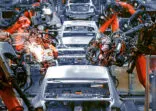The first two months of the coronavirus outbreak wiped out vast amounts of wealth as stock markets plummeted, but it was followed by a sharp rebound in April and May, subsequently sustained by unbridled enthusiasm for the technology sector. The recovery has been especially generous to China’s business high-flyers.
“This year has seen the biggest wealth increase in the 22 years of the Hurun China Rich List,” said Rupert Hoogewerf, Hurun Report chairman and chief researcher, in a statement.
The Hurun Research Institute’s China Rich List 2020 is a ranking of the wealthiest individuals in China (as at 28 August), with a minimum threshold of RMB 2bn ($290m).
A surge in share prices and several primary listings on stock markets have minted five new dollar billionaires in China a week for the past year, according to the report. Their combined wealth was $4trn, an increase of $1.5tn compared with 2019, which was more than the previous five years combined.
“China’s entrepreneurs have done much better than expected… suggesting that the structure of the economy has evolved, moving away from traditional sectors like manufacturing and real estate, towards the new economy,” noted Hoogewerf.
While 64% made their money from traditional sectors, there are now 34% that are from the new economy, according to the report. Electronic components, new energy and new materials made up 63% of advanced manufacturing.
Indeed, 10 companies, led by Alibaba, provided the channel for 137 people to join this years list, accounting for 6% of the total number, noted Hoogewerf.
As many as 2,398 individuals made the list of China’s richest, up 32% or 579 individuals from last year, and 1,921 people saw their wealth grow, up from 949 in 2019, while 641 saw their wealth shrink or stay the same, down from 1,136 last year, according to the report.
Ma on top
Jack Ma retained the top spot for the third year running with $58.8bn, up 45% ahead of the impending IPO of fintech platform Ant and due to a strong performance by e-commerce platform Alibaba. Pony Ma (no relation) was second, with his wealth up 50% to $57.4bn on the back of Tencent’s gaming business doing better than expected, its Wechat service expanding and strong returns on some of its investments, such as Tesla and JD. New top-10 entrant Zhong Shanshan of YST, best-known for bottled water brand Nongfu, came in at number three with $53.7bn.
Women made up 24.9%, down 2% on last year, and Yang Huiyan of property developer Country Garden, is the richest woman with $33bn, up 29% from last year.
Although Beijing has the highest concentration of rich-listers, with 325 or 14% of the list, Shenzhen was the fastest-riser, adding 84 individuals to a total of 275. Perhaps significantly, Suzhou overtook Hong Kong to sixth place.
Other key findings in the report include that 55 people have amassed $10bn or more, up 23 or 70% and the cut-off to make the Top 10 was up 70% to $29.4bn. The average age was 55, but 256 people under 40 made the list, 100 more than last year, and 27 people born in the 1990s made the list, 16 more than last year, although Nie Yunchen, 29, of popular tea brand Heytea was the only self-made individual under 30.
“Born just before the Cultural Revolution, the average Hurun rich lister went to university in the early eighties and started their business in the mid to late nineties,” said Hoogewerf.
However, some of China’s wealthiest have found that money does not mean a life without woe.
Luckin Coffee’s main shareholders Lu Zhengyao and Jenny Qian Zhiya both dropped off the list after the share price collapsed on the back of a fraud, while 17 rich-listers are in trouble with the law, of which 15 are under investigation and two in prison.
Meanwhile, former richest man in China Huang Guangyu of Gome was released on parole in June after 12 years in prison. Huang’s wealth was up 24% to $4.1bn, keeping him in the Top 200, according to the report.
Top 10 Richest Individuals in China


















